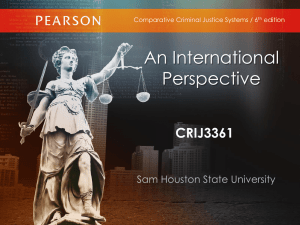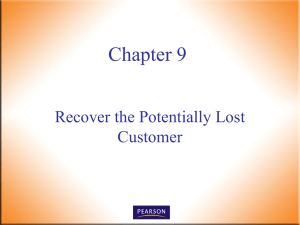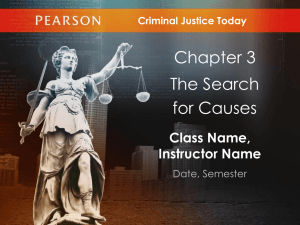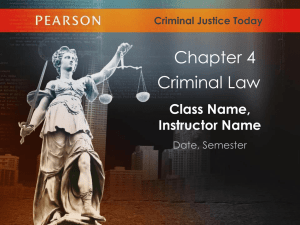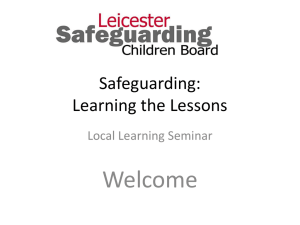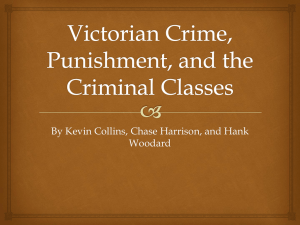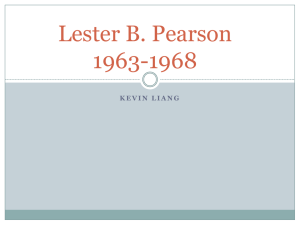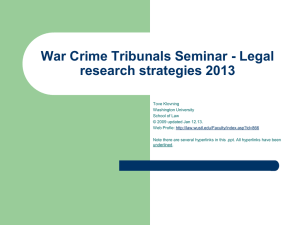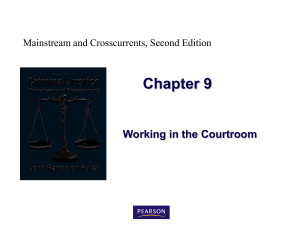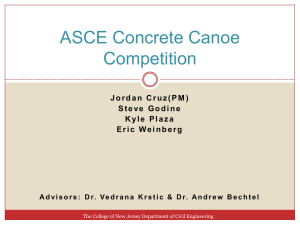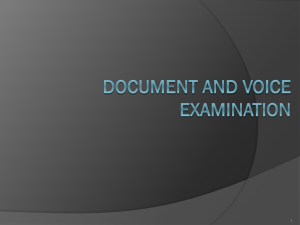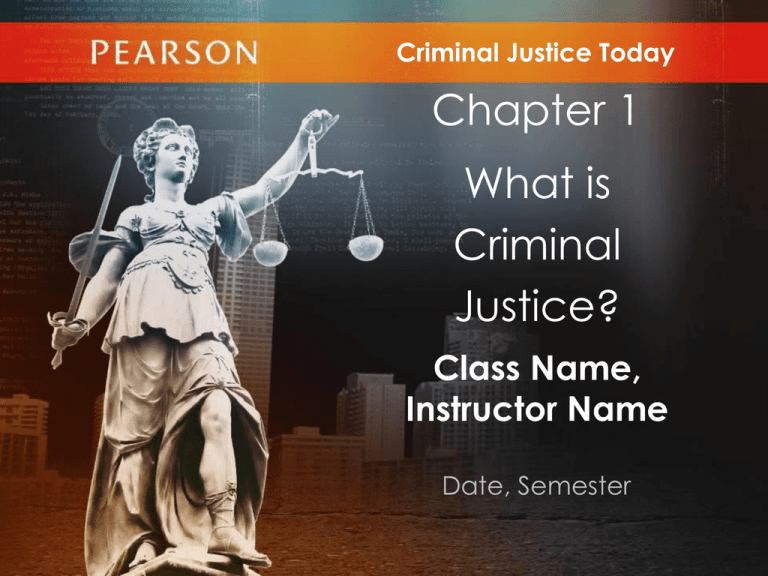
Criminal Justice Today
Chapter 1
What is
Criminal
Justice?
Class Name,
Instructor Name
Date, Semester
CHAPTER AGENDA
1.1
Summarize the history of crime in America and corresponding
changes in the American criminal justice system.
1.2
Describe the public order (crime control) and individual rights
(due process) perspectives of criminal justice, concluding with
how the criminal justice system balances the two perspectives.
1.3
Explain the relationship of criminal justice to general concepts of
equity and fairness.
1.4
Describe the American criminal justice system in terms of its three
major components and their respective functions.
© 2013 by Pearson Higher Education, Inc
Upper Saddle River, New Jersey 07458 • All Rights Reserved
CHAPTER AGENDA
1.5
Describe the process of American criminal justice, including the
stages of criminal case processing.
1.6
Define due process of law, including where the American legal
system guarantees due process.
1.7
Describe the role of evidence-based practice in contemporary
criminal justice.
1.8
Explain how multiculturalism and diversity present challenges to
and opportunities for the American system of criminal justice.
© 2013 by Pearson Higher Education, Inc
Upper Saddle River, New Jersey 07458 • All Rights Reserved
1.0
Key Terms
Crime
4
Criminology
Criminal
Justice
Criminal
Justice
System
© 2013 by Pearson Higher Education, Inc
Upper Saddle River, New Jersey 07458 • All Rights Reserved
Learning Objectives
After this lecture, you should be able to complete the following Learning Outcomes
1.1
Summarize the history of crime in
America and corresponding changes
in the American criminal justice
system.
© 2013 by Pearson Higher Education, Inc
Upper Saddle River, New Jersey 07458 • All Rights Reserved
1.1
6
Adequate law enforcement involves a global effort
© 2013 by Pearson Higher Education, Inc
Upper Saddle River, New Jersey 07458 • All Rights Reserved
1.1
7
Events that changed the focus of law enforcement
© 2013 by Pearson Higher Education, Inc
Upper Saddle River, New Jersey 07458 • All Rights Reserved
Learning Objectives
After this lecture, you should be able to complete the following Learning Outcomes
1.2
Describe the public order (crime control)
and individual rights (due process)
perspectives of criminal justice, concluding
with how the criminal justice system
balances the two perspectives.
© 2013 by Pearson Higher Education, Inc
Upper Saddle River, New Jersey 07458 • All Rights Reserved
1.2
Individual
Rights
9
Public
Order
© 2013 by Pearson Higher Education, Inc
Upper Saddle River, New Jersey 07458 • All Rights Reserved
1.2
Herbert L. Packer Identified Two Models in 1968—
The Crime Control and Due Process Models
Individual
Rights
10
Public
Order
© 2013 by Pearson Higher Education, Inc
Upper Saddle River, New Jersey 07458 • All Rights Reserved
Learning Objectives
After this lecture, you should be able to complete the following Learning Outcomes
1.3
Explain the relationship of criminal
justice to general concepts of equity
and fairness.
© 2013 by Pearson Higher Education, Inc
Upper Saddle River, New Jersey 07458 • All Rights Reserved
1.3
Photo placeholder
© 2013 by Pearson Higher Education, Inc
Upper Saddle River, New Jersey 07458 • All Rights Reserved
Learning Objectives
After this lecture, you should be able to complete the following Learning Outcomes
1.4
Describe the American criminal
justice system in terms of its three
major components and their
respective functions.
© 2013 by Pearson Higher Education, Inc
Upper Saddle River, New Jersey 07458 • All Rights Reserved
1.4
Criminal Justice System Structure
Police
Corrections
14
Courts
© 2013 by Pearson Higher Education, Inc
Upper Saddle River, New Jersey 07458 • All Rights Reserved
Learning Objectives
After this lecture, you should be able to complete the following Learning Outcomes
1.5
Describe the process of American
criminal justice, including the stages
of criminal case processing.
© 2013 by Pearson Higher Education, Inc
Upper Saddle River, New Jersey 07458 • All Rights Reserved
1.5
Investigation and Arrest
Probable
Cause
16
Warrant
Arrest
Miranda
Rights
© 2013 by Pearson Higher Education, Inc
Upper Saddle River, New Jersey 07458 • All Rights Reserved
1.5
© 2013 by Pearson Higher Education, Inc
Upper Saddle River, New Jersey 07458 • All Rights Reserved
1.5
Criminal Justice Process
Booking
First
Appearance
Arraignment
18
Preliminary
Hearing
Trial
Information/
Indictment
Sentencing
© 2013 by Pearson Higher Education, Inc
Upper Saddle River, New Jersey 07458 • All Rights Reserved
Corrections
Learning Objectives
After this lecture, you should be able to complete the following Learning Outcomes
1.6
Define due process of law, including
where the American legal system
guarantees due process.
© 2013 by Pearson Higher Education, Inc
Upper Saddle River, New Jersey 07458 • All Rights Reserved
1.6
© 2013 by Pearson Higher Education, Inc
Upper Saddle River, New Jersey 07458 • All Rights Reserved
Learning Objectives
After this lecture, you should be able to complete the following Learning Outcomes
1.7
Describe the role of evidence-based
practice in contemporary criminal
justice.
© 2013 by Pearson Higher Education, Inc
Upper Saddle River, New Jersey 07458 • All Rights Reserved
1.7
Development of Academic Criminal
Justice
1920s
August Vollmer
began criminal
justice
education
196070s
Introduction of
Criminology/
NIJ
2011
OJP and the
expansion of
evidence
based
research
© 2013 by Pearson Higher Education, Inc
Upper Saddle River, New Jersey 07458 • All Rights Reserved
Learning Objectives
After this lecture, you should be able to complete the following Learning Outcomes
1.8
Explain how multiculturalism and
diversity present challenges to and
opportunities for the American system
of criminal justice.
© 2013 by Pearson Higher Education, Inc
Upper Saddle River, New Jersey 07458 • All Rights Reserved
1.8
Photo placeholder
© 2013 by Pearson Higher Education, Inc
Upper Saddle River, New Jersey 07458 • All Rights Reserved
CHAPTER SUMMARY
1.1
Summarize the history of crime in America and corresponding
changes in the American criminal justice system.
1.2
Describe the public order (crime control) and individual rights
(due process) perspectives of criminal justice, concluding with
how the criminal justice system balances the two perspectives.
1.3
Explain the relationship of criminal justice to general concepts of
equity and fairness.
1.4
Describe the American criminal justice system in terms of its three
major components and their respective functions.
© 2013 by Pearson Higher Education, Inc
Upper Saddle River, New Jersey 07458 • All Rights Reserved
CHAPTER SUMMARY
1.5
Describe the process of American criminal justice, including the
stages of criminal case processing.
1.6
Define due process of law, including where the American legal
system guarantees due process.
1.7
Describe the role of evidence-based practice in contemporary
criminal justice.
1.8
Explain how multiculturalism and diversity present challenges to
and opportunities for the American system of criminal justice.
© 2013 by Pearson Higher Education, Inc
Upper Saddle River, New Jersey 07458 • All Rights Reserved

